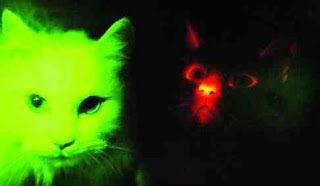by Reuters
Source
South Korean scientists have cloned Turkish Angora cats with a red fluorescent protein produced by manipulating their genes, which makes them give off an eerie glow when hit by certain ultraviolet light.
A team lead by Kong Il-Keun, an animal cloning expert at Gyeongsang National University, said the cats would be used for genetic research.
The cats do not glow in the dark, but their ears, noses and other places where fur cover is minimal give off a red glow when hit with the ultraviolet light.
 This picture taken under ultraviolet light in a dark room shows a cloned Turkish Angola cat, right, whose genes were modified with a fluorescent protein, giving it a red fluorescent glow. A normally cloned cat of the same variety, at left, appears green in the ultraviolet light.
This picture taken under ultraviolet light in a dark room shows a cloned Turkish Angola cat, right, whose genes were modified with a fluorescent protein, giving it a red fluorescent glow. A normally cloned cat of the same variety, at left, appears green in the ultraviolet light.
The cats were born earlier this year, but the results of the procedure were only made public by the Ministry of Science and Technology this week.
Kong is a pioneer in South Korean in cat cloning.
South Korea, once a world leader in cloning and human embryonic stem cell studies, suffered a major setback after two papers on human embryonic stem cells by once acclaimed scientist Hwang Woo-suk were found to be based on faked data.
© The Calgary Herald 2007
South Korean scientists have cloned Turkish Angora cats with a red fluorescent protein produced by manipulating their genes, which makes them give off an eerie glow when hit by certain ultraviolet light.
A team lead by Kong Il-Keun, an animal cloning expert at Gyeongsang National University, said the cats would be used for genetic research.
The cats do not glow in the dark, but their ears, noses and other places where fur cover is minimal give off a red glow when hit with the ultraviolet light.
 This picture taken under ultraviolet light in a dark room shows a cloned Turkish Angola cat, right, whose genes were modified with a fluorescent protein, giving it a red fluorescent glow. A normally cloned cat of the same variety, at left, appears green in the ultraviolet light.
This picture taken under ultraviolet light in a dark room shows a cloned Turkish Angola cat, right, whose genes were modified with a fluorescent protein, giving it a red fluorescent glow. A normally cloned cat of the same variety, at left, appears green in the ultraviolet light. Choi Byung-gil, Reuters
The cats were born earlier this year, but the results of the procedure were only made public by the Ministry of Science and Technology this week.
Kong is a pioneer in South Korean in cat cloning.
South Korea, once a world leader in cloning and human embryonic stem cell studies, suffered a major setback after two papers on human embryonic stem cells by once acclaimed scientist Hwang Woo-suk were found to be based on faked data.
© The Calgary Herald 2007


